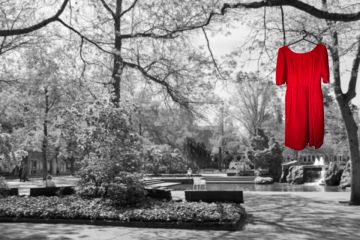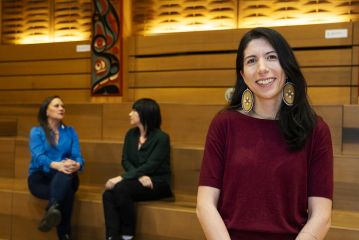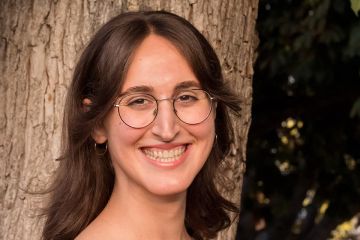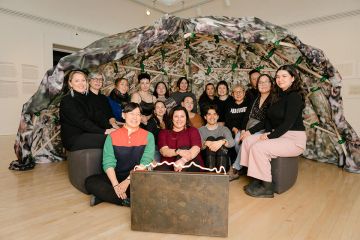Canada 150 event led by one of the world’s most respected ethnobotanists
- Anne MacLaurin
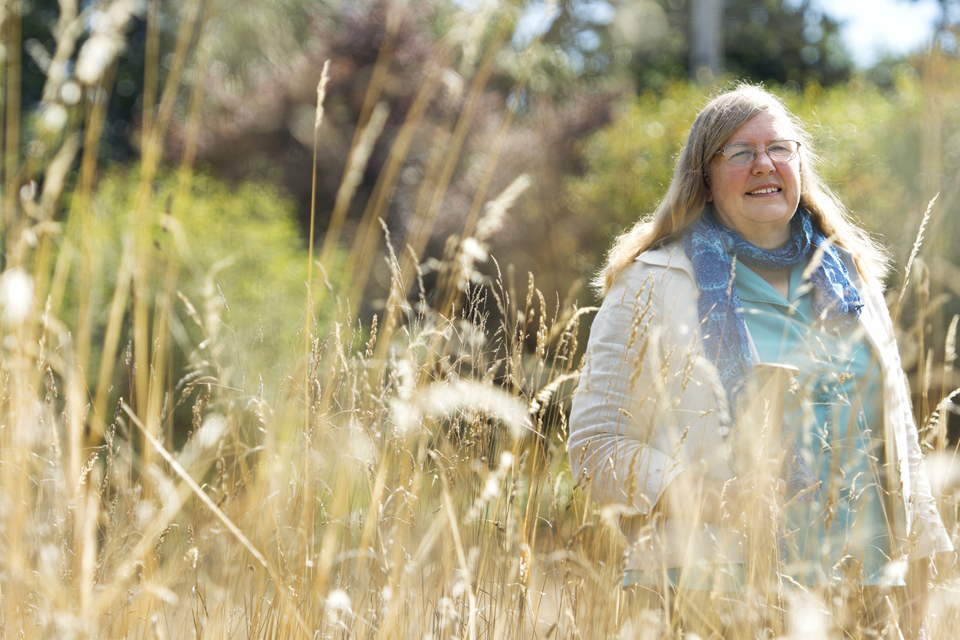
UVic ethnobotanist and ethnoecologist Nancy Turner, a long-time champion of Indigenous knowledge, has devoted her career to understanding and communicating the crucial role that plants play in Indigenous cultures and languages, especially with respect to plants, land use, rights and title.
As part of Turner’s legacy and her 2015 Pierre Elliott Trudeau Fellowship, she is leading a four-day ethnoecology symposium at UVic (May 2 to 5, now full to capacity), featuring Indigenous leaders and knowledge holders, legal scholars, ethnobotanists, ethnoecologists and students, to discuss the roles of ethnobotany and ethnoecology in policy and legal decision-making in relation to Indigenous land rights and title.
“My research legacy has been to weave together ethnographic descriptions of human-plant relationships within a broader framework of Indigenous cultural landscapes and resource management systems that reflect the deep and enduring relationships between First Nations and their territories,” says Turner.
Working together for natural restoration
Turner was honoured last week by her friends and colleagues at a special faculty event, “Working Together—Celebrating Stories of Culture, Community & Natural Restoration.” The Ceremonial Hall in First Peoples House at UVic was filled with love and warmth for Turner and every story reflected the compassion and gratitude people felt for her. Many Indigenous people shared their love and respect for Turner and in the words of one elder, “without Nancy….we would have lost our family’s medicines.”
Turner has been a long-standing UVic environmental studies professor and was the inaugural Hakai Research Chair in Ethnoecology for five years, among many other honours. She is one of the most respected ethnobotanists in the world—specializing in ethnoecological studies with Western Canadian Indigenous Peoples, particularly in BC.
Ethnoecology is the study of how people understand their environment and relationship to ecosystems. Turner began collaborating with First Nations people more than 45 years ago to document and promote their traditional knowledge of plants including foods, materials and medicines. Her research and teaching about the relationships between Indigenous peoples and plants, and how these relationships influence the landscapes and habitats of Western Canada helped establish UVic as a national and international leader of ethnoecology and traditional knowledge studies.
Her book, Ancient Pathways, Ancestral Knowledge: Ethnobotany and Ecological Wisdom of Indigenous Peoples of Northwestern North America, was announced the winner of the 2016 Canada Prize in the Social Sciences by the Federation for the Humanities and Social Sciences.
“I am indebted to these people and want to acknowledge them and the critical importance of their teachings, their language and their relationships to plants and places,” adds Turner.
Ethnoecology Symposium (May 2 to 5)
Sponsored by the Pierre Elliott Trudeau Foundation, the Indigenous Peoples' Land Rights and the Roles of Ethnoecology and Ethnobotany Symposium will discuss new directions for land and resource planning and decision-making in this province, across Canada and beyond, and will be hosted by UVic’s School of Environmental Studies. It is one of four signature series events by UVic to mark Canada’s 150th anniversary.
Turner is hopeful it will have the potential to assist in deliberations around land rights and title for Indigenous peoples.
“This symposium has allowed me the opportunity to bring together the rich knowledge of so many Indigenous plant experts and researchers, and to show the importance of this knowledge not only to First Nations but to all Canadians,” says Turner.
With a maximum number of 100 participants, the symposium promises to be an intimate experience for those attending and for the 35 guest speakers, many of whom are traditional knowledge holders and leaders in their field, such as:
- Jeannette Armstrong (Syilx Okanagan) who holds a Canada Research Chair at UBC-Okanagan and is a fluent speaker of Nsyilxcn and a traditional knowledge keeper of the Okanagan Nation;
- Seliliye Belinda Claxton (WSÁNEC), who will teach a hands-on cedar-bark-rose making workshop at the symposium; and
- Arthur Adolph of the Xaxli’p First Nation (St’at’imc), former Chief and council member, and an expert in traditional land and resource use.
The symposium will also include four UVic speakers:
- Jeff Corntassel (Cherokee Nation), director of Indigenous Governance at UVic, who will explore strategies for reclaiming Indigenous homelands and waterways to sustain future generations;
- John Lutz, chair of UVic’s Department of History, who is particularly interested in the moment of first contact between Indigenous peoples and Europeans in the 1770s to the 1970s;
- Darcy Mathews of UVic’s School of Environmental Studies, who works in collaboration with the Songhees, Heiltsuk, and other First Nation communities as an ethnoecologist and archaeologist researching the history of intertidal resource management, among other areas; and
- James Tully, a constitutional expert and professor emeritus in political science, law, Indigenous governance and philosophy at UVic who is currently editing a volume on reconciliation and resurgence, along with John Borrows of UVic's Faculty of Law, who is a member of the Chippewas of the Nawash First Nation and the Canada Research Chair in Indigenous Law at UVic.
“It is very exciting to bring such a diverse group of people together,” says Turner, “and my hope is our discussions will help to inform land and resource use deliberations and treaty negotiations.”
“People in Place: the Worldview We Need” with renowned essayist John Ralston Saul
Included in the symposium agenda is a keynote address on ethnoecology and resurgence by John Ralston Saul on May 3 at 7:30 p.m. at UVic in the David Lam Auditorium of the MacLaurin Building.
Update: Space is limited and registration for this public event is now closed.
Photos
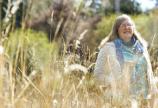
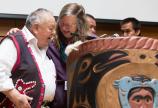
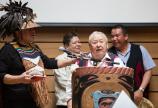
In this story
Keywords: colonialism, Indigenous, plants, reconciliation, ethnoecology, ethnobotany, traditional knowledge, research
People: Nancy Turner, John Ralston Saul







